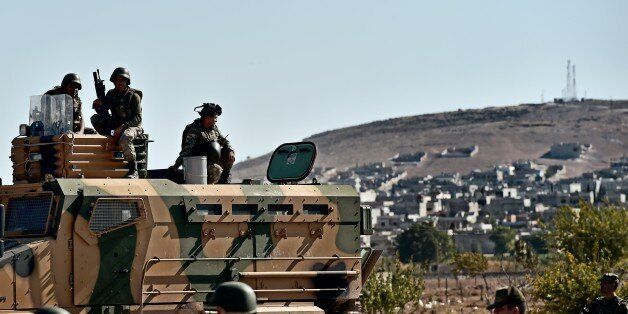The Turkish military is just watching as outgunned and outnumbered Kurdish fighters warn that a massacre is imminent in a town visible across the Syrian border. The fighters have been defending a key Kurdish stronghold in Syria against hardline militants aligned with the self-proclaimed Islamic State for nearly three weeks, but may not be able to hold out much longer.
Kurdish fighters in Kobani have battled for 20 days as the militants took scores of local villages and some 160,000 people have fled across the nearby border into Turkey. The lightly armed Kurdish forces defending the town, also known as the People’s Protection Units or YPG, have largely succeeded in fending off the militants, who are armed with heavy artillery and tanks, some of that U.S.-made and seized from other Syrian rebels and Iraqi forces. But Islamist forces have ramped up their efforts in recent days, shelling the town on Friday and Saturday.
Some of the heaviest battles so far took place Sunday, as Islamic State forces battled Kurdish fighters for control of a strategic overlook. An Islamic State missile reportedly hit a house in Turkey close to the Syrian border and wounded five people, according to Reuters.
Meanwhile, U.S.-led coalition airstrikes have done little to stop the siege of Kobani. According to U.S. Central Command, the coalition led nine airstrikes against Islamic State targets in Syria on Friday and Saturday, reportedly killing at least 35 militants. However, Kurdish fighters maintain that those attacks are largely ineffective in aiding the Kobani defenders.
“Airstrikes alone are really not enough to defeat ISIS in Kobani,” Idris Nassan, who acts as Kobani’s foreign minister, told The Guardian. “They are besieging the city on three sides, and fighter jets simply cannot hit each and every [Islamic State] fighter on the ground.”
Last week, Turkey’s Parliament voted to authorize military action in Iraq and Syria against the Islamic State if it is deemed necessary. The 298-98 vote also gave the Turkish government a mandate to allow foreign troops to launch operations from within Turkey.
“We wouldn’t want Kobani to fall,” Turkish Prime Minister Ahmet Davutoglu said. “We welcomed our brothers who came from Kobani. We’ll do whatever we can to prevent this from happening.”
While the vote has received much attention as a possible step in the right direction, this is the third consecutive year the Turkish Parliament has voted in favor of military authorization to retaliate across the border in Syria without taking subsequent military action.
Many Kurds are skeptical that Turkey will cross the border and help fend off the militants’ advances in Kobani. Turkish leaders have yet to articulate any plans for lifting the siege. And on Friday, the BBC reported that Turkish tanks stood idle as Kobani faced further militant attacks.
“The Turkish state has declared its hostility to the Kurds with its reluctance,” Burhan Atmaca, a Turkish Kurd, told Agence France-Presse as he watched the fighting from across the Turkish border. “We no longer have confidence in Turkey. We will fend for ourselves.”
Indeed, despite last week’s vote, Turkey has made it clear that there will likely be no military action anytime soon. Meanwhile, rumors run rampant about Turkey’s supporting the Islamic State and turning a blind eye both to extremist recruiting cells within its own borders and to the use of smuggling routes to and from Syria.
Within the Turkish government, there is growing concern that the U.S.-led coalition focuses too much on defeating the Islamic State and not at all on toppling longtime Syrian President Bashar Assad. There is also worry over possible attacks on and within Turkey if the country did take up arms against the Islamic State.
In particular, Turkey is concerned about YPG’s ties to the Kurdistan Workers’ Party, or PKK, which has been in conflict with the Turkish state for 30 years. Designated a terrorist group by Turkey and the United States for its attacks on Turkish soldiers, the PKK has called for basic civil rights, greater freedoms for Kurds and the establishment of an ethnic homeland independent from Turkey (a demand since tabled).
Recently, imprisoned PKK leader Abdullah Ocalan has warned that a fragile peace process with Turkey would abruptly end if Kobani fell to the Islamic State, threatening the country with internal conflict even as neighboring Syria implodes from its own war.
“I am calling on those in Turkey who don’t want to see the process collapse to shoulder responsibility,” Ocalan said in a statement from prison on Thursday. “The reality of Kobani and the peace process are not separable.”
Over 40,000 people in Turkey have died in the conflict between the Kurds and the Turkish state since 1984, the majority of them Kurds.




